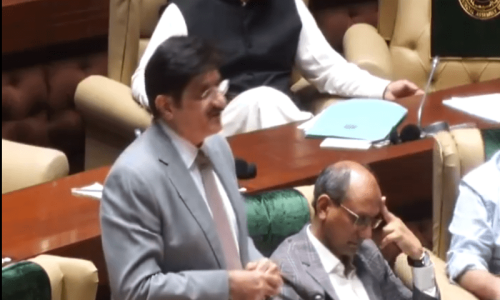KARACHI: “This cycle, in a way, reflects my struggles in life. You can turn it into a wheel-chair when you are at home, or use it as a bicycle if you are venturing out. It can also help you earn a living as it has a box on the back in which you can put stuff according to your needs,” pointed out Imran Ghanchi, a physically challenged person, whose designed cycle was on display at an event held on Thursday to mark the culmination of ‘Accessible Cycle Design Challenge’.
Titled ‘Moving People, Changing Minds’, the programme was organised by the Network of Organisations Working with People with Disabilities, Pakistan (NOWPDP), a non-governmental organisation working for the rights of persons with disabilities.
Early this year, it announced a cycle design contest to facilitate mobility of people with disabilities in which more than 150 students and professionals across the country participated, submitting 58 entries.
“A major problem for a disable person is his restricted movement. In my case, I was able to learn a lot of skills but couldn’t get the platform to employ them,” Mr Ghanchi explained at the programme, which also featured an exhibition displaying the top cycle designs of the contest.
A polio victim, Mr Ghanchi is married to a woman having the same disability, has a daughter and now works with NOWPDP that provided him the opportunity to utilise his skills productively.
His tricycle was the only prototype on display at the programme.
Sharing his feelings, Taufeeq Elahi Diju, an industrial-electrical engineer who won the contest, said: “When my friend emailed the contest details, the first thought which struck me was we all are disabled in a way as human life has become so dependent on technology these days. Hence, it’s a matter of perspective how we see things and the term disabled sounds weird today,” he said while appreciating the contest that helped the youth to get their talent recognised.
Speaking about the design of its tricycle that he named Orbis 3, he said that his priority was to design a low-cost but comfortable and efficient vehicle that could address all needs of people with disabilities.
“It offers a full package. No imported material is used and all components are easily available at a cycle shop. If it goes into mass production, it will cost between Rs10,000 and 12,000,” he said, adding that he reviewed foreign cycle designs before creating one.
A National University of Sciences and Technology, Karachi, team, comprising, Daim Ali, Bayan Mashrequi, Ahsan Iftikhar and Danish Haider, won the award for the most innovative design.
“Apart from being low-cost and comfortable, the cycle doesn’t require pedalling, which requires more force and is tiring, but rather pulling, just like you propel a boat,” said Mashrequi after receiving the award.
Earlier, president of NOWPDP Amin Hasmani welcomed the guests and appreciated students and professionals for their participation in the contest and said the aim was to create a vehicle which not just suited the needs of people in the country, but also become popular internationally.
“I hope something larger will come out of this initiative,” he remarked.
The organisation, he said, would now make prototypes of the cycle designs recommended by the jury and later efforts would be made for their mass production.
Regretting that most people with disabilities had no access to quality health and education in the country, he said the situation was shameful.
Director of the NGO Omair Ahmed spoke about the different programmes being carried out by the organisation.
Seasoned architect Shahid Abdullah and chief executive officer of Automobile Corporation of Pakistan Khayam Husain also spoke.
Earlier, shields were distributed to acknowledge the services of individuals who provided assistance in organising the contest. The jury members included international experts, for instance, Matt McCambridge, an instructor at D-Lab Massachusetts Institute of Technology, US.
Published in Dawn, June 3rd, 2016














































Dear visitor, the comments section is undergoing an overhaul and will return soon.